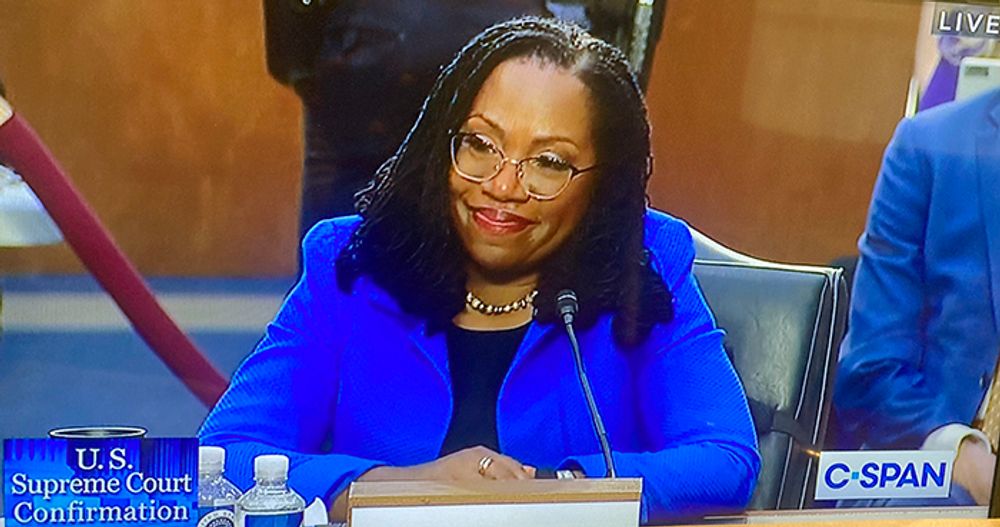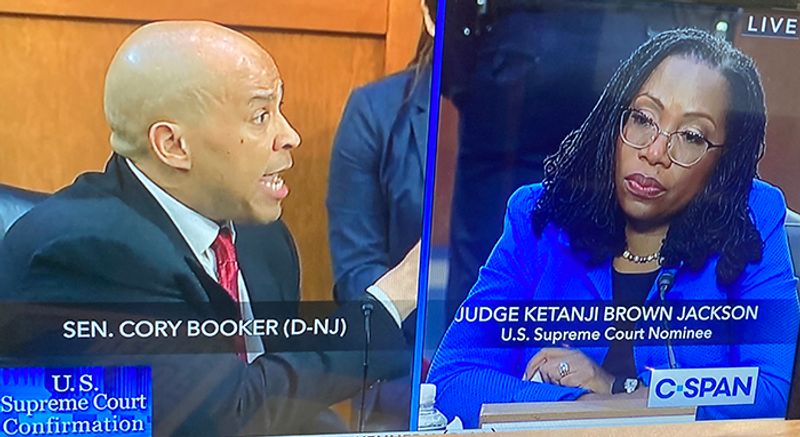Blog
Emil Guillermo: Asian Americans should see ourselves in Supreme Court nominee Ketanji Brown Jackson

Ketanji Brown Jackson should be the next Supreme Court Justice of the United States.
Just start calling her KBJ now.
She’s been called, by virtue of her legal experience, the most qualified nominee for the Supreme Court in history. But, of course, she would have to be. People of color always have to be twice as good to overcome the racism we face.
Jackson is maybe 5x-10x good. She’s that special.
No one on the current court has her depth and range, from public school to Harvard, to Harvard Law, SCOTUS clerk, public defender, Sentencing Commission, District Court judge to Court of Appeals judge. That’s a heck of a resume for anyone.
Initially, I admit, I was wrong about Jackson.
When President Biden announced her as his nominee, I didn’t know much about her and wondered why an Asian American wasn’t picked for the slot.
African Americans have Clarence Thomas. There’s never been an Asian American Supreme Court justice ever.
But after what Jackson went through at the hands of Republicans during the Senate Judiciary Committee hearings this week, the woman is a saint.
The court needs one of those.
Jackson survived and stood up to questioning that was both intellectually dishonest, as well as flat-out “vicious.”
That was the word used by committee chair Dick Durbin (D-Ill.) to describe last Wednesday’s bruising, relentless questioning by Republican members.
It was a mugging.
But that’s because the Republicans were mugging too, for the cameras. Lindsey Graham, Ted Cruz, Josh Hawley, and Tom Cotton all want to be the next Donald Trump. So they auditioned at the public’s and Jackson’s expense. Cordial and congratulatory on introduction, but then the long knives came out for a full-frontal attack over an issue that was shocking, emotional, and understandable for voters.
The claim? That Jackson was soft on crime because of sentences in a small subset of the hundreds of cases she’s handled. In fewer than 20 cases involving child pornography, her sentences were less than the national guidelines. But more than 70 percent of judges nationwide have complained the sentencing minimums are too high.
Jackson said as a mother, she was troubled by such heinous cases. But using what she called her “methodology” of being neutral, considering the facts, and writing opinions that were transparent, she handed out fair and just sentences. In every case brought up by Cruz and company, there was jail time. Soft on crime? The National Fraternal Order of Police supports Jackson. So do the police chiefs. The American Bar Association calls her “well qualified.”
But the Republicans, unable to deal with such a super qualified BIPOC candidate, have decided this is the issue they will use to break Jackson. Child porn is political dynamite; It’s the evil twin of abortion–so emotional, it can divide an electorate.
Either that’s the game, or Republicans just like talking about child porn. This is their QAnon hill to die on.
As Cruz or Hawley badgered, Jackson firmly said she had answered the question and stood by her answer. With respect.
Cruz and Hawley were like a WWF tag team. After Hawley ended his hounding of Jackson on the third day, (Jackson’s blue blazer day), Sen. Mazie Hirono was recognized by the chair. But then Cruz made a scene insisting on entering a document that Chairman Durbin indicated could have been entered without such fanfare.
Hirono began. “Aloha, Judge Jackson.”
“Aloha,” Jackson replied.
“I’m going to try to spread some Aloha into this room,” Hirono said.
It did bring some calm. But Jackson always stayed cool under pressure and didn’t crack.
Only Sen. Cory Booker made her cry, but for the right reasons.
Amid the thunder of demagoguery, Booker must have looked like a New Jersey rest stop. He allowed her to just be human.
Booker talked about her mother and father who were sitting in the room. Jackson had mentioned how they lived through legal segregation in Florida. Booker talked about her brother the cop, who also served in the military. He talked about Brown’s civil rights hero, Judge Constance Baker Motley.
But then Booker said he saw Jackson and saw his own mom. And his cousins. And all the ancestors standing with her.
And you know? I saw myself too.
CONNECTING WITH KBJ
Coincidentally, I share a few things with Jackson. I debated in high school. Did OO (Original Oratory) in the NFL. Football? National Forensics League. We both went to Harvard too, though I was there 15 years before.
On the first day of the hearings, I was struck by the introduction given by one of her college roommates, Lisa Fairfax, now a law professor at the University of Pennsylvania. Fairfax talked about meeting Jackson in her freshman year. “Those first moments when you wonder if you belong,” Fairfax said. “She’s the friend that made sure we all did.”
Fairfax went on: “She was the role model who makes you believe in what she said, ‘You can do it and here’s how.’ And she showed us how, by the power of her example of hard work, preparation and excellence that transforms the seemingly impossible into the achievable.”
I wish I had that kind of college friend in my time in Cambridge 15 years earlier.
On Wednesday, Jackson called herself, “a black woman [and]lucky inheritor of the civil rights dream.”
With humility, she sounded like she understood the journey all people of color are on.
“I do consider myself having been born in 1970 to be the first generation to benefit from the civil rights movement,” Jackson said. “From the legacy of all of the work of so many people that went into changing the laws of this country so that people like me could have an opportunity to be sitting here before you today,”
That was said before more of the onslaught from Graham, Cruz, and Hawley.
And if you watched it all like I did, you felt the impact of each attack.
When Booker took his turn early Wednesday evening, he provided reassuring comfort.
“You have earned this spot,” he said, to ward off any self-doubt or a sense of “imposter syndrome” thoughts that may be lurking. “You are worthy. You are a great American.”
Booker was just warming up. As one of the last five senators to question Jackson, he was bringing it home. And it worked. Because I found I could totally relate to Jackson.

If you have experienced even the most minor transgression because of race, you could see yourself as she sat in the committee chamber.
“There is a love in this country that is extraordinary,” Booker said to Jackson. Booker then referenced the racial segregation laws affecting Jackson’s family, as well as the laws that would have prevented her own intermarriage. The same anti-miscegenation laws that kept Asians like my Filipino father from marrying whites. “But [people] didn’t stop loving this country, even though this country didn’t love them back.”
It’s the reason Jackson was before the committee, Booker said. It was about all the people who came here and said “I’m going to show this country that I can be free here, that I can make this country love me as much as I love it.”
And then he mentioned Asian Americans, specifically.
“Chinese Americans first forced into near slave labor building our railroads connecting our country saw the ugliest of America, but they were going to build their home here [and say] ‘America, you may not love me yet, but I’m going to make this nation live up to its promise and hope.’”
A shout out. You can see it on C-SPAN.
It infused a much-needed sense of diversity and inclusion and love in a room that had been stripped of it by the preening Republicans.
“And so you faced insults here that were shocking to me,” Booker said to Jackson. “But you are here because of that kind of love. And nobody’s taking this away from me.”
It was the joy that Booker felt, that other people of color shared with him, from the random person on the street to his own relatives. We all see ourselves in Jackson with a pride and joy.
Booker closed reminding Jackson that she will face more of what she experienced when the vote comes before the full Senate: “Don’t worry. God has got you. And how do I know that? Because you’re here and I know what it’s taken for you to sit in that seat.”
Yes. People of color know the struggle. She’s in that seat for us.
As Booker talked, Jackson wiped her eyes.
And that’s all we really need to know about the judge.
Sure, we want judges to go after the “bad guys.”
And it’s good to know their judicial philosophy or “methodology.”
But we want to know they are human too. That they have a heart. And that given individual circumstances, they can break the cookie-cutter and responsibly balance punishment with a sense of public forgiveness, a constructive empathy.
There was a lot more of that at the hearing than you think. And that’s what the hearings should be about.
It was to get to know Ketanji. Not “Gotcha” Ketanji.
She showed her legal chops. Her tenacity under fire. And she showed her humanity.
If I had a vote, I would cast it in a second for Ketanji Brown Jackson. A vote for history.
###
NOTE: I will talk more about this and about Jackson’s plan to recuse herself from the Harvard affirmative action case, on E. 272 and 273 of “Emil Amok’s Takeout,” the microtalk show of the AAPI. Catch it livestreamed at 2p Pacific on Facebook, on my YouTube channel, and on Twitter. Catch the recording later on www.amok.com

Emil Guillermo is an independent journalist/commentator. Updates at www.amok.com. Follow Emil on Twitter, and like his Facebook page.
The views expressed in his blog do not necessarily represent AALDEF’s views or policies.
Read Emil's full bio →